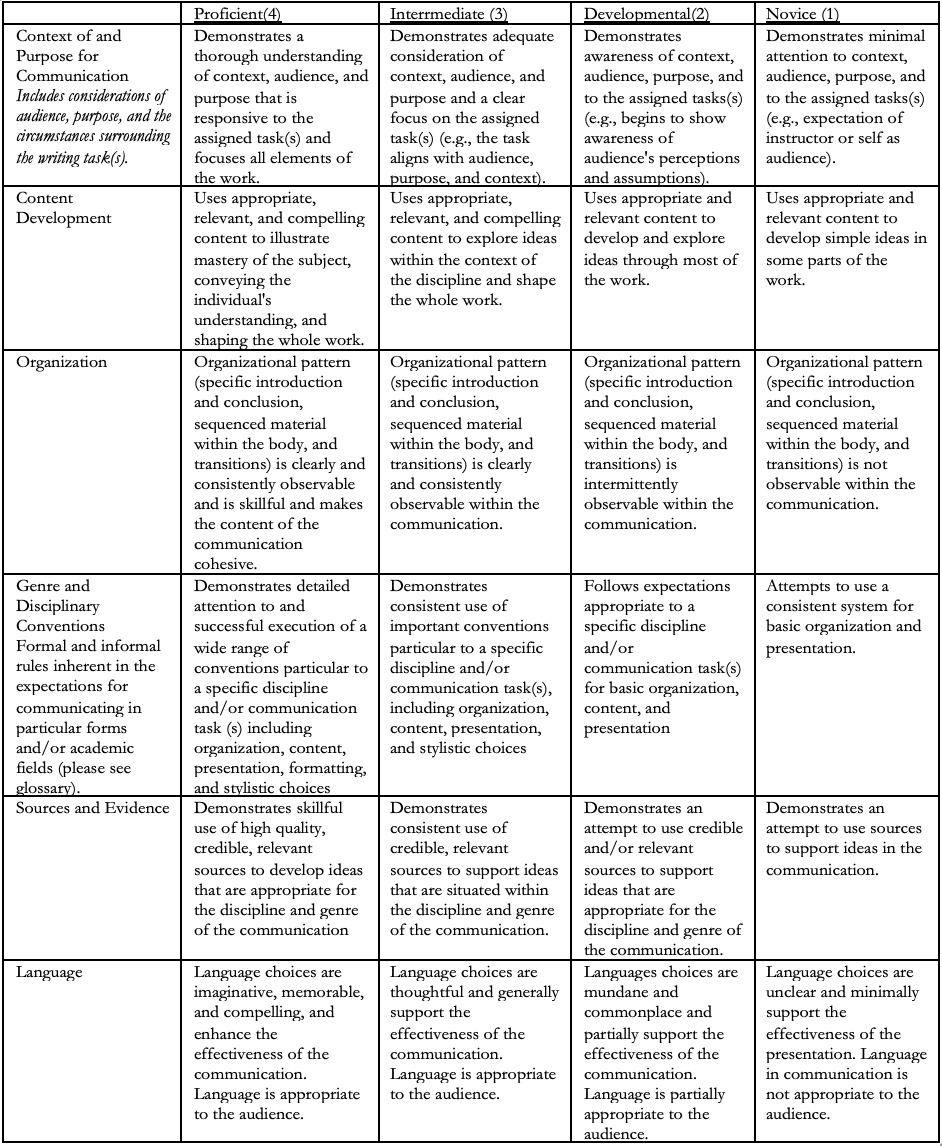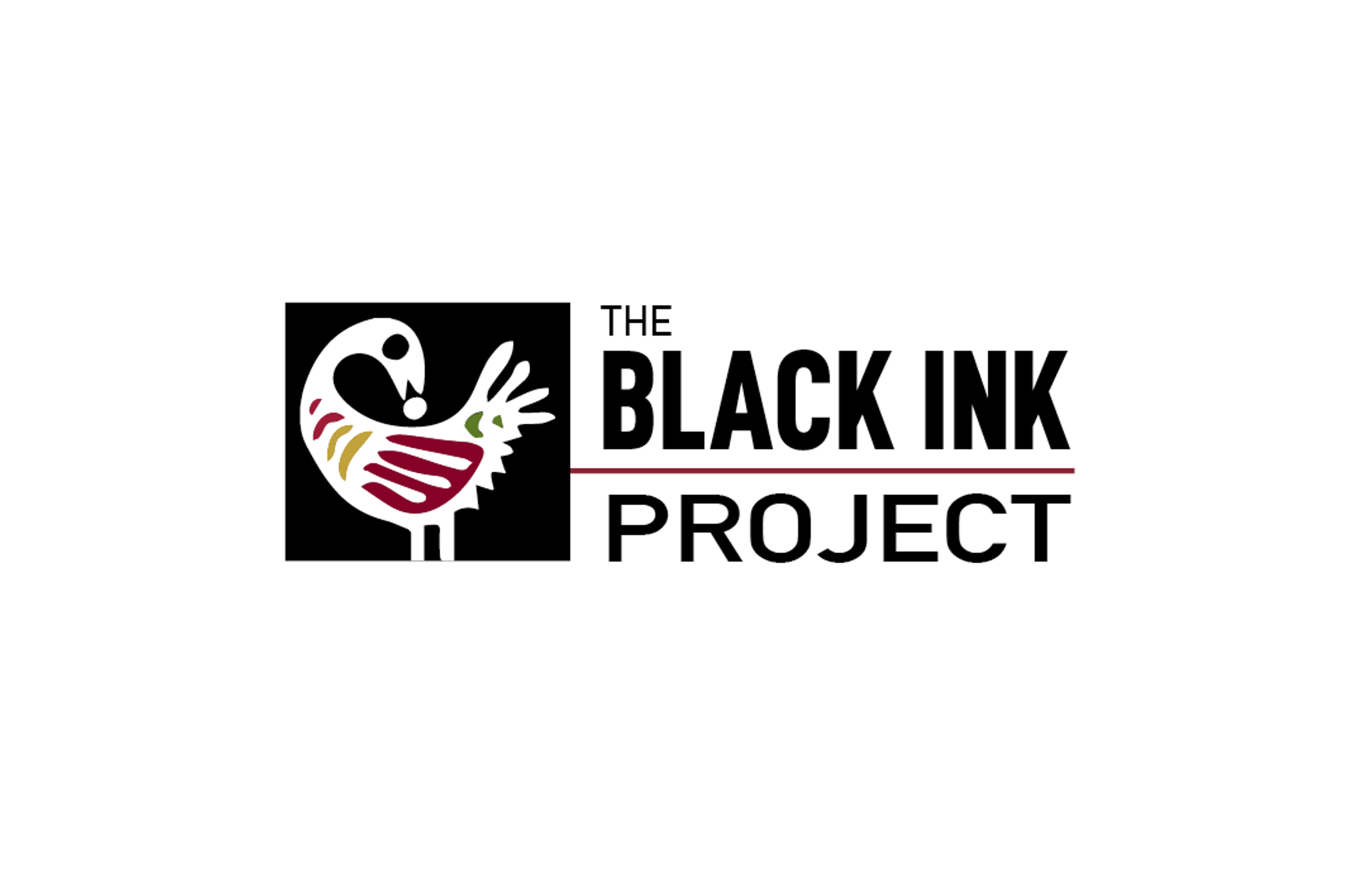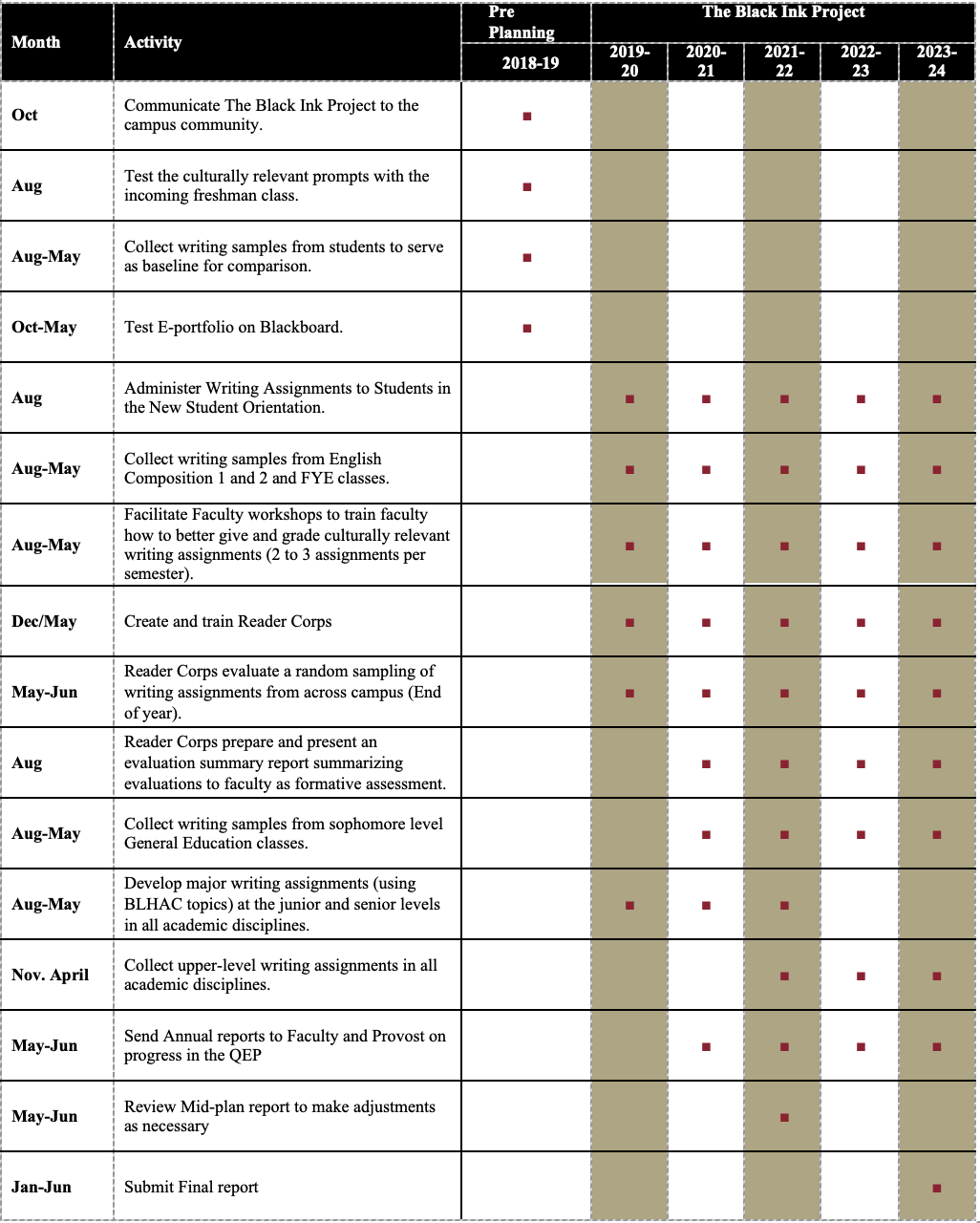Morehouse College’s Quality Enhancement Plan (QEP): The Black Ink Project
The overarching goal of The Black Ink Project is to increase the writing proficiency of students. As part of Morehouse College’s Quality Enhancement Plan (QEP), The Black Ink Project will provide them with opportunities to immerse themselves in the writing process at every stage of their educational experience at the College—from English Composition 101 and 102, First Year Experience (FYE), the General Education Curriculum (Gen Ed), Black Life, History, and Culture (BLHAC), and to significant culminating senior –level writing assignments in the disciplines (WID). This goal, which is consistent with the tradition of articulate servant leadership for which Morehouse Men are known, will be informed and facilitated through students’ selection of writing topics related to Black Life, History, and Culture (BLHAC). Key to the success of this plan will be equipping faculty with the knowledge of culturally relevant pedagogy and strategies for teaching and assessing writing skills across the curriculum and within disciplines. The project emphasizes assessment and use of results to inform strategies for improving student writing over time. This focused assessment process over the five-year period of the QEP will also contribute to building and strengthening a culture of assessment at Morehouse College. The specific goals, anticipated Student Learning Outcomes (SLOs), and Faculty Development Outcomes (FDEOs) are as follows:
Goal One: Provide students with numerous opportunities to engage in writing activities that improve their written communication skills throughout their matriculation at the College.
Students will be able to:
- Produce a grammatically and mechanically correct written document with proper sourcing, if required.
- Organize a coherent and cohesive written document.
- Utilize critical thinking when producing a written document.
- Correctly apply an appropriate mode of writing, considering the context and purpose of the document.
Goal Two: Facilitate student exploration and selection of writing topics related to Black Life, History, and Culture (BLHAC) in First Year Experience, General Education, and discipline-specific courses.
Students will write a document that:
- Draws upon aspects of the lives, histories, and cultures of Black people (BLHAC).
- Will design significant writing assignments for junior/senior students using culturally relevant
Goal Three: Provide opportunities for faculty development in teaching and assessment strategies to facilitate improvements in student writing and use of BLHAC topics.
Through Faculty Development Workshops, faculty will:
- Will be trained to use culturally relevant teaching strategies and assessment methods as they prepare students in First Year Experience, General Education, and discipline-specific courses for writing assignments using BLHAC content.
- Will design significant writing assignments for junior/senior students using culturally relevant topics in their discipline.
Goal 4: Morehouse College will become known for producing research on the Black males’ writing and writing pedagogy, particularly on the use of culturally relevant topics in the writing process.
(FDEOs) are as follows:
- Conduct research on the use of culturally relevant topics in the writing process.
- Faculty members will establish a Morehouse-based internal and virtual global Community of Practice to share and discuss results of QEP related research.
QEP Timeline
The Black Ink Project aims to improve the writing skills of all Morehouse students by emphasizing high-level written communication in several fundamental places: (1) English Composition 101 and 102; (2) First Year Experience (FYE), the General Education Curriculum (Gen Ed), the BLHAC courses, and significant culminating writing assignments in the disciplines; (3) Faculty Workshops designed to teach faculty the techniques identified as the best practices to teach and assess writing; and (4) assigning students to the Writing Center for individualized tutoring to develop and improve language skills.
Faculty Writing Workshops
The goal of the Faculty Writing Workshops is to improve the quality of writing instruction across the campus. Upon completion of the workshops, faculty members will be able to use teaching techniques that are immediately transferable to their classrooms. Faculty members who participate in a workshop learn about (1) Pedagogy of writing, (2) Culturally Relevant Pedagogy and designing effective writing assignments; (3) Writing in disciplines; (4) Strategies for responding to and evaluating student writing; (5) Designing writing assignments that motivate Critical Thinking/Reading; and (6) Function of student conferences. Faculty members who embrace the best practices for teaching and assessing writing will be invited as guest speakers or workshop facilitators in subsequent semesters and will be compensated for their participation.
Faculty Writing Workshops 2019-2022
Writing in the Discipline, or “learning to write” for specific disciplines, is a concept that is included in the Writing Across Curriculum pedagogy. The following describes best practices Morehouse College will use in structuring its emphasis on Writing in the Discipline: Writing intensive courses promote the following goals:
- Writing as Discovery: Students in writing intensive courses spend significant time completing writing assignments that encourage them to develop the habit of using writing to explore new ideas, reflect on these ideas in relation to themselves, and construct knowledge for themselves.
- Writing/Thinking as Process: The writing process of mature writers is reinforced in writing intensive classes. Students are given instruction in prewriting, drafting, revising, and editing.
- Writing in Context: Purpose and audience are the primary factors shaping discourse. Students are given clear instructions regarding purpose, format, and designated audience.
- Writing to Achieve Course Aims: The assignments in a writing intensive course are used to develop higher levels of critical thinking.
- Amount of Writing: Students are encouraged to write only if their writing is an integral part of the course; therefore, a significant portion (possibly 50% or more) of a student’s course grade should be based on the writing assigned.
- Incorporate Culturally Oriented Materials and Topics: It is suggested that culturally referenced course materials and topics may develop and enhance self-esteem, and thus build confidence in African American students to produce highly proficient writing samples.
Assessment and Evaluation of The Black Ink Project
Student writing will be assessed for attainment of the student learning outcomes using the QEP Writing Rubric. The QEP will be considered to have improved students’ writing if students who have progressed through (1) English Composition 101 and 102; (2) First Year Experience (FYE); (3) the General Education Curriculum (Gen Ed); (4) the Black, Life, History, and Culture; and (5) the discipline-specific courses demonstrate the attainment of the five learning outcomes at a level higher than those students enrolled at Morehouse prior to the installation of the new writing paradigms. Research will also be encouraged on measuring the impact of the Faculty Writing workshops on the student learning outcomes. Achievement of the student learning outcomes will be demonstrated in written artifacts stored in e-portfolios. Results obtained from a variety of assessment instruments used to evaluate the success of the QEP’s implementation and adjust it as needed to modify activities and increase its effectiveness.
The Black Ink Project features a new institutional practice for Morehouse in assessing student writing. Electronic portfolios will both encourage process-based writing and reflection and generate authentic artifacts for assessment. In addition, The Black Ink Project increases faculty ownership of writing assessment, moving it from the margins to the center by opening regular conversations about how to improve teaching and learning. Artifacts will be collected from student electronic portfolios and will be evaluated using the Morehouse QEP Writing Rubric.
Morehouse College believes that The Black Ink Project can dramatically improve student learning outcomes through the combination of better preparing teachers and increasing the motivation of students through the culturally relevant topics. The desired outcomes for the students are as follows:
After the freshmen year, 80% of the randomly selected students will average a 2 on the rubric associated with the five Student Learning Outcomes.
- After the sophomore year, 80% of the randomly selected students will average a 3 on the rubric associated with the five Student Learning Outcomes.
- After the junior year, 80% of the randomly selected students will average a 3 on the rubric associated with the five Student Learning Outcomes.
- After the senior year, 80% of the randomly selected students will average a 4 on the rubric associated with the five Student Learning Outcomes.
- On the faculty and research outcomes, Morehouse aims to achieve a 4 on the rubric associated with all of those outcomes by the end of the project period.
QEP Writing Rubric
The Morehouse QEP Writing Rubric promotes validity and reliability and also provides students with perspectives on precisely what is valued and expected in their writing. The Rubric assesses at four levels of writing proficiency: Novice (1), Development (2), Intermediate (3), and Proficient (4). See below:
Morehouse College’s Rubric for Effective Communication

Our Challenge
President Dr. David A. Thomas has set an ambitious goal for the graduating class of 2022 to have at least a 70% graduation rate. The Black Ink Project is a critical component that will net great returns and allow us to enhance outcomes related to retention, persistence, and graduation rates. The Black Ink Project, with support of Morehouse’s Writing program and Writing Center, will help the College to meet the strategic goals of enhanced recruitment and admissions, increased persistence toward degree, and improved four and six-year graduation rates.
______
The Black Ink Project. Dr. Nathaniel Norment, Jr., Director and Chair of the QEP Committee. nathaniel.norment@morehouse.edu

Tag(s):
Morehouse Faculty
